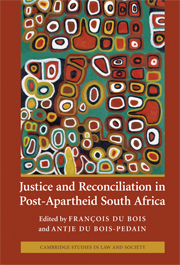Book contents
- Frontmatter
- Contents
- List of tables and figures
- List of contributors
- Acknowledgements
- List of abbreviations
- Introduction
- 1 Reconciliation as surrender: configurations of responsibility and memory
- 2 Radical forgiveness: transforming traumatic memory beyond Hannah Arendt
- 3 Communicating criminal and political responsibility in the TRC process
- 4 The contribution of criminal justice
- 5 Reparation and the forms of justice
- 6 Land restitution and reconciliation in South Africa
- 7 For justice and reconciliation to come: the TRC archive, big business and the demand for material reparations
- 8 Transition, forgiveness and citizenship: the TRC and the social construction of forgiveness
- 9 The evolving legitimacy of the South African Constitutional Court
- 10 Drawing the line: justice and the art of reconciliation
- 11 Post-conflict justice and the reconciliatory paradigm: the South African experience
- Index
- References
6 - Land restitution and reconciliation in South Africa
Published online by Cambridge University Press: 01 July 2009
- Frontmatter
- Contents
- List of tables and figures
- List of contributors
- Acknowledgements
- List of abbreviations
- Introduction
- 1 Reconciliation as surrender: configurations of responsibility and memory
- 2 Radical forgiveness: transforming traumatic memory beyond Hannah Arendt
- 3 Communicating criminal and political responsibility in the TRC process
- 4 The contribution of criminal justice
- 5 Reparation and the forms of justice
- 6 Land restitution and reconciliation in South Africa
- 7 For justice and reconciliation to come: the TRC archive, big business and the demand for material reparations
- 8 Transition, forgiveness and citizenship: the TRC and the social construction of forgiveness
- 9 The evolving legitimacy of the South African Constitutional Court
- 10 Drawing the line: justice and the art of reconciliation
- 11 Post-conflict justice and the reconciliatory paradigm: the South African experience
- Index
- References
Summary
INTRODUCTION
Schemes of property rights rectification are seldom influenced in the real world by a profound understanding of property theory. Still, the political dynamics that drive such schemes are almost always informed by intuited understandings of the meaning and importance of property rights. And property theorists, for all their abstractions, often attempt to spell out the implications of their theories for real-world problems. It would therefore be surprising if property theory had nothing to say about how schemes of property rights rectification ought to be implemented. It should also be possible to assess such schemes from the perspective of property theory, using competing theoretical understandings of property rights to explain the practical problems encountered, and, conversely, using practical problems to assess the relative merits of competing theoretical understandings.
This chapter aims to construct a dialogue of this sort between Robert Nozick's historical entitlement theory of property and the South African scheme for restitution of land rights. The next section briefly states Nozick's theory before contrasting it with its main theoretical rival: ‘general-right-based’ arguments for private property. Because of their concern for the connection between property rights and personality, it is argued, general-right-based arguments provide a more convincing explanation of the moral wrong done to property holders when their rights are unjustly taken away. They also suggest an approach to the rectification of past unjust transfers that has much in common with the idea of restorative justice.
- Type
- Chapter
- Information
- Justice and Reconciliation in Post-Apartheid South Africa , pp. 144 - 171Publisher: Cambridge University PressPrint publication year: 2009



